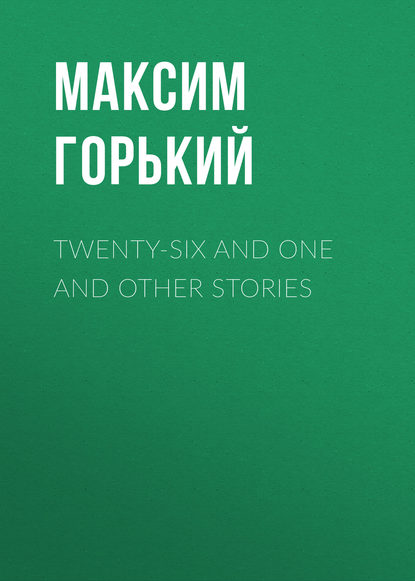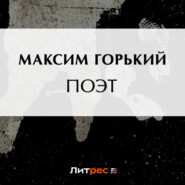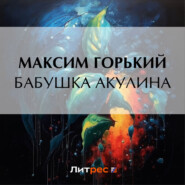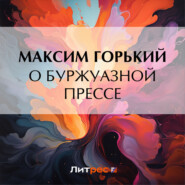По всем вопросам обращайтесь на: info@litportal.ru
(©) 2003-2024.
✖
Twenty-six and One and Other Stories
Настройки чтения
Размер шрифта
Высота строк
Поля
"What's the matter with me?"
"Nothing.."
"Well, quicker, give me biscuits.."
She had never before hurried us on..
"There's plenty of time!" said the baker, his eyes fixed, on her face.
Then she suddenly turned around and disappeared behind the door.
The baker took up his shovel and said calmly, turning towards the oven:
"It is done, it seems!.. The soldier!.. Rascal!.
Scoundrel!".
Like a herd of sheep, pushing one another, we walked back to the table, seated ourselves in silence and began to work slowly. Soon some one said:
"And perhaps not yet.".
"Go on! Talk about it!" cried the baker.
We all knew that he was a clever man, cleverer than any of us, and we understood by his words that he was firmly convinced of the soldier's victory… We were sad and uneasy. At twelve o'clock, during the dinner hour, the soldier came. He was, as usual, clean and smart, and, as usual, looked straight into our eyes. We felt awkward to look at him.
"Well, honorable gentlemen, if you wish, I can show you a soldier's boldness,".. said he, smiling proudly. "You go out into the hallway and look through the clefts… Understand?"
We went out and, falling on one another, we stuck to the cleft, in the wooden walls of the hallway, leading to the yard. We did not have to wait long… Soon Tanya passed with a quick pace, skipping over the plashes of melted snow and mud. Her face looked troubled. She disappeared behind the cellar door. Then the soldier went there slowly and whistling. His hands were thrust into his pockets, and his moustache was stirring.
A rain was falling, and we saw the drops fall into plashes, and the plashes were wrinkling under their blows. It was a damp, gray day – a very dreary day. The snow still lay on the roofs, while on the ground, here and there, were dark spots of mud. And the snow on the roofs, too, was covered with a brownish, muddy coating. The rain trickled slowly, producing a mournful sound. We felt cold and disagreeable.
The soldier came first out of the cellar; he crossed the yard slowly,
Stirring his moustache, his hands in his pockets – the same as always.
Then Tanya came out. Her eyes.. her eyes were radiant with joy and happiness, and her lips were smiling. And she walked as though in sleep, staggering, with uncertain steps. We could not stand this calmly. We all rushed toward the door, jumped out into the yard, and began to hiss and bawl at her angrily and wildly. On noticing us she trembled and stopped short as if petrified in the mud under her feet. We surrounded her and malignantly abused her in the most obscene language. We told her shameless things.
We did this not loud but slowly, seeing that she could not get away, that she was surrounded by us and we could mock her as much as we pleased. I don't know why, but we did not beat her. She stood among us, turning her head one way and another, listening to our abuses. And we kept on throwing at her more of the mire and poison of our words.
The color left her face. Her blue eyes, so happy a moment ago, opened wide, her breast breathed heavily and her lips were trembling.
And we, surrounding her, avenged ourselves upon her, for she had robbed us. She had belonged to us, we had spent on her all that was best in us, though that best was the crusts of beggars, but we were twenty-six, while she was one, and therefore there was no suffering painful enough to punish her for her crime! How we abused her! She was silent, looked at us wild-eyed, and trembling in every limb. We were laughing, roaring, growling. Some more people ran up to us. Some one of us pulled Tanya by the sleeve of her waist..
Suddenly her eyes began to flash; slowly she lifted her hands to her head, and, adjusting her hair, said loudly, but calmly, looking straight into our eyes:
"Miserable prisoners!"
And she came directly toward us, she walked, too, as though we were not in front of her, as though we were not in her way. Therefore none of us were in her way, and coming out of our circle, without turning to us, she said aloud, and with indescribable contempt:
"Rascals!.. Rabble!".
Then she went away.
We remained standing in the centre of the yard, in the mud, under the rain and the gray, sunless sky..
Then we all went back silently to our damp, stony ditch. As before, the sun never peeped in through our windows, and Tanya never came there again!..
Tchelkache
The sky is clouded by the dark smoke rising from the harbor. The ardent sun gazes at the green sea through a thin veil. It is unable to see its reflection in the water so agitated is the latter by the oars, the steamer screws and the sharp keels of the Turkish feluccas, or sail boats, that plough the narrow harbor in every direction. The waves imprisoned by stone walls, crushed under the enormous weights that they carry, beat against the sides of the vessels and the quays; beat and murmur, foaming and muddy.
The noise of chains, the rolling of wagons laden with merchandise, the metallic groan of iron falling on the pavements, the creaking of windlasses, the whistling of steamboats, now in piercing shrieks, now in muffled roars, the cries of haulers, sailors and custom-house officers – all these diverse sounds blend in a single tone, that of work, and vibrate and linger in the air as though they feared to rise and disappear. And still the earth continues to give forth new sounds; heavy, rumbling, they set in motion everything about them, or, piercing, rend the hot and smoky air.
Stone, iron, wood, vessels and men, all, breathe forth a furious and passionate hymn to the god of Traffic. But the voices of the men, scarcely distinguishable, appear feeble and ridiculous, as do also the men, in the midst of all this tumult. Covered with grimy rags, bent under their burdens, they move through clouds of dust in the hot and noisy atmosphere, dwarfed to insignificance beside the colossal iron structures, mountains of merchandise, noisy wagons and all the other things that they have themselves created. Their own handiwork has reduced them to subjection and robbed them of their personality.
The giant vessels, at anchor, shriek, or sigh deeply, and in each sound there is, as it were, an ironical contempt for the men who crawl over their decks and fill their sides with the products of a slaved toil. The long files of 'longshoremen are painfully absurd; they carry huge loads of corn on their shoulders and deposit them in the iron holds of the vessels so that they may earn a few pounds of bread to put in their famished stomachs. The men, in rags, covered with perspiration, are stupefied by fatigue, noise and heat; the machines, shining, strong and impassive, made by the hands of these men, are not, however, moved by steam, but by the muscles and blood of their creators – cold and cruel irony!
The noise weighs down, the dust irritates nostrils and eyes; the heat burns the body, the fatigue, everything seems strained to its utmost tension, and ready to break forth in a resounding explosion that will clear the air and bring peace and quiet to the earth again – when the town, sea and sky will be calm and beneficent. But it is only an illusion, preserved by the untiring hope of man and his imperishable and illogical desire for liberty.
Twelve strokes of a bell, sonorous and measured, rang out. When the last one had died away upon the air, the rude tones of labor were already half softened. At the end of a minute, they were transformed into a dull murmur. Then, the voices of men and sea were more distinct. The dinner hour had come.
* * * * *
When the longshoremen, leaving their work, were dispersed in noisy groups over the wharf, buying food from the open-air merchants, and settling themselves on the pavement, in shady corners, to eat, Grichka Tchelkache, an old jail-bird, appeared among them. He was game often hunted by the police, and the entire quay knew him for a hard drinker and a clever, daring thief. He was bare-headed and bare-footed, and wore a worn pair of velvet trousers and a percale blouse torn at the neck, showing his sharp and angular bones covered with brown skin. His touseled black hair, streaked with gray, and his sharp visage, resembling a bird of prey's, all rumpled, indicated that he had just awakened. From his moustache hung a straw, another clung to his unshaved cheek, while behind his ear was a fresh linden leaf. Tall, bony, a little bent, he walked slowly over the stones, and, turning his hooked nose from side to side, cast piercing glances about him, appearing to be seeking someone among the 'longshoremen. His long, thick, brown moustache trembled like a cat's, and his hands, behind his back, rubbed each other, pressing closely together their twisted and knotty fingers. Even here, among hundreds of his own kind, he attracted attention by his resemblance to a sparrow-hawk of the steppes, by his rapacious leanness, his easy stride, outwardly calm but alert and watchful as the flight of the bird that he recalled.
When he reached a group of tatterdemalions, seated in the shade of some baskets of charcoal, a broad-shouldered and stupid looking boy rose to meet him. His face was streaked with red and his neck was scratched; he bore the traces of a recent fight. He walked along beside Tchelkache, and said under his breath:
"The custom-house officers can't find two boxes of goods. They are looking for them. You understand, Grichka?"
"What of it?" asked Tchelkache, measuring him calmly with his eyes.
"What of it? They are looking, that's all."
"Have they inquired for me to help them in their search?"
Tchelkache gazed at the warehouses with a meaning smile.
"Go to the devil!"
The other turned on his heel.
"Hey! Wait! – Who has fixed you up in that fashion? Your face is all bruised – Have you seen Michka around here?"
"I haven't seen him for a long time!" cried the other, rejoining the 'longshoremen.
Tchelkache continued on his way, greeted in a friendly manner by all. But he, usually so ready with merry word or biting jest, was evidently out of sorts to-day, and answered all questions briefly.
Behind a bale of merchandise appeared a custom-house officer, standing in his dark-green, dusty uniform with military erectness. He barred Tchelkache's way, placing himself before him in an offensive attitude, his left hand on his sword, and reached out his right hand to take Tchelkache by the collar.

















